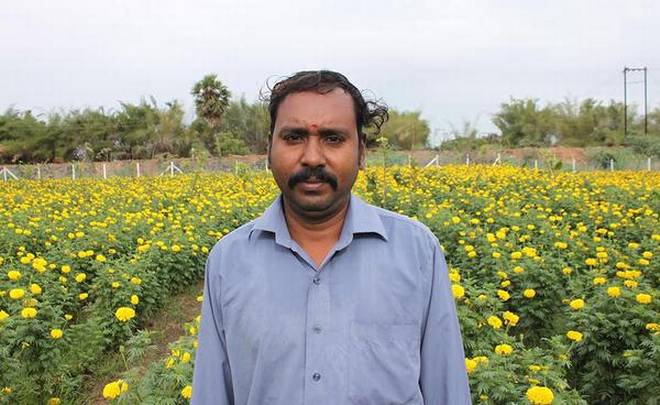Mannargudi farmer shows an alternative to water-intensive crops
When K. Marimuthu decided to cultivate yellow marigold, a flower in demand for garland-making, instead of paddy in Mannargudi, situated in the Cauvery delta rice belt, other farmers warned that he was taking a risk.
“But I proved them wrong. I have harvested eight tonnes [of marigold] even though those who supplied the saplings predicted that the yield would be between three and five tonnes,” said Mr. Marimuthu, who has already started experimenting with cultivation of other flowers, including kozhikondai poo (hen’s horn flower), jasmine and sambanki (Magnolia champaca).
Garland-makers in Mannargudi regularly buy flowers from Thanjavur and Tiruchi. Mr. Marimuthu’s experiment fulfils local needs and the money needed for transportation is saved.
He also opted for drip irrigation and, in the process, saved about 80% of the water that would have been required for paddy cultivation. “The profit is also very high. I would have earned a maximum ₹20,000 per acre [cultivating paddy]. Marigold has so far earned me ₹1.5 lakh, after all the expenses, including labour, pesticides and fertilizers,” said Mr. Marimuthu, who buys saplings and manure from farmers in Hosur.
He planted 25-day-old plants and the yield began from the 60th day. Though marigold continues to yield for 120 days, he was able to extend flowering up to 145 days. “The only problem will be rain. We can save the saplings by giving them support, but flowers will not tolerate heavy rain. We will learn the art of floriculture through experiments,” he said, adding that a few farmers had already taken a cue from him and begun cultivating flowers.
Mannargudi MLA T.R.B. Raja, who has been advocating the idea of switching to alternative and less water-intensive crops, agreed.
Roping in experts
“Forget Cauvery water. Climate change is a major factor. Heavy dependency on water is not possible,” said Mr. Raja, who had already consulted experts from Israel and is planning to rope in their expertise in a big way.
He said there was a need to change the mindset of the people and farmers in the Needlamangalam area, who had successfully cultivated cotton crop, even though the workforce for plucking wasn’t adequate.
Reiterating that “precision farming” was the way forward, he said farmers who cultivated paddy in the Kovilveni area were waiting for the government to open procurement centres, and gradually fell prey to middlemen. “Heavy use of fertilizers for paddy has already killed the soil. Let us opt for alternative crops like millets, cotton and flowers. They will help replenish the soil,” he said.
source: http://www.thehindu.com / The Hindu / Home> News> States> Tamil Nadu/ by B. Kolappan / Chennai – September 05th, 2018
